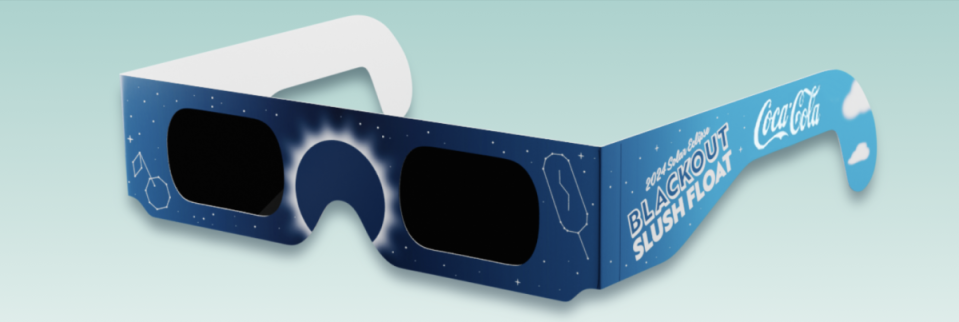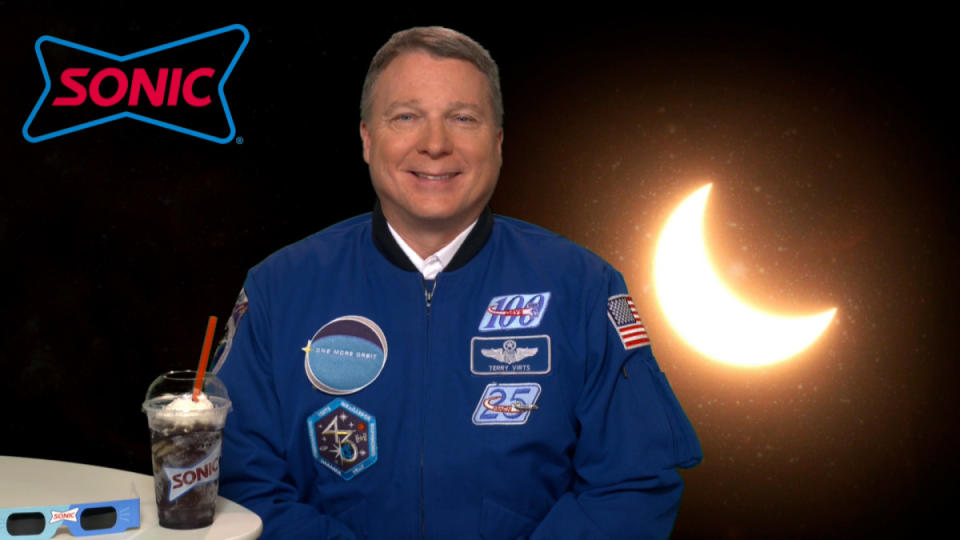Former Commander of the International Space Station Shares Tips for Viewing the Eclipse: ‘This Is Something Worth Seeing'

- Oops!Something went wrong.Please try again later.
Terry Virts
Houston, we're ready for the North American eclipse of 2024.
The celestial event is happening on Monday, April 8, and there won't be another in the United States for another 20 years, so it's "worth taking a little bit of effort" to see, according to former International Space Station Commander Terry Virts.
"This is a rare thing. It took me 50 years before I saw my first eclipse," the retired NASA astronaut and SONIC Drive-In superfan told Parade in an exclusive interview. "If you have a chance to see it, you should take that chance."
But what exactly will you need and where should you go? Before you gaze up at the sky, Colonel Virts has shared with Parade everything you need to know about the 2024 eclipse and how to best and safely view it.
Related: When Is the Next Eclipse? Plus, Astronomers and Astrologists Answer Your Burning Eclipse Questions
What Exactly Is an Eclipse?
It's a celestial event that doesn't happen often, as Colonel Virts points out.
"The moon goes around the earth every month, and it has a shadow all the time. The sun shines on it. And downstream from the sun, there's a shadow that goes off into space," he explains. "So normally, this shadow is just in space, nobody sees it. But every once in a while the plane of the moon's orbit intersects the plane of the earth's orbit around the sun and that shadow goes across earth. And usually like once a year, maybe a couple times a year, somewhere on earth will get this shadow."

SONIC Drive-In
How To Safely View the Eclipse
You're going to want to get yourself a pair of eclipse viewing glasses (which SONIC Drive-In is giving away for free with their eclipse-inspired treat, the “Blackout Slush Float").
Colonel Virts notes that special glasses "are very important because you don't want to stare at the sun with your naked eye. Or even normal sunglasses are not good. You will get your retina burned if you stare at the sun with normal sunglasses."
For those unable to get their hands on eclipse certified glasses, the former astronaut suggests taking a piece of cardboard and poking a hole in it. The pinhole, he explains, "will shine the sun down on the ground, so you can look down on the ground and see the sun on the ground through a pinhole."
Related: Everything to Know About the 2024 Eclipse Season
When Can You Look at the Eclipse Without Protective Wear?
When the moon is covering the sun and there is no more sun, only then will it be safe to look up without glasses—but it was last long.
Colonel Virts warns against looking at the sun without glasses "because it doesn't take long before your retina gets burned," adding, "That's permanent. That is damage that will never heal."
Where Are the Best Spots To View the Eclipse?
The total solar eclipse will be passing over the United States on April 8. According to NASA, the path of totality in the U.S. stretches from Texas to Maine. "There [are] a lot of major cities that are in or near that path of totality," Colonel Virts says.
San Antonio, Waco, Austin, Dallas, Indianapolis, Cleveland, Buffalo, Rochester and Syracuse are among the cities in the path. "If you're near it, drive to get as deep into the totality as you can, because you'll want to see the darkness for as many minutes as you can," Colonel Virts explains. "In the center of this band, you can get over four minutes of complete darkness, which it's gonna happen fast."
"Every additional minute you can get is worth it. So it's worth getting in the car, packing up the family, take them out of school, you know, call in sick to work," he adds. "This is not gonna happen in America for 20 years, so this is something worth seeing."
Related: Krispy Kreme and Oreo Team Up for Limited-Time Menu Item Honoring the Solar Eclipse
Tips for Better Visibility
"Cloud cover is a big thing," according to Colonel Virts.
He adds, "So it's hard to predict the weather, it's hard to predict where clouds are. Even if it's cloudy, if you're in the totality zone, it'll turn dark. So it'll still be an amazing experience to see daylight turn into nighttime, but you're gonna want to be able to see the sun because you can see something called 'looping prominences' or you'll see the sun's atmosphere. It looks like this amazing ring around the moon. So if you can see that, you're gonna want to get somewhere where there's no clouds."

Courtesy SONIC Drive-In
What Else To Look at During the Eclipse
While you're, of course, going to want to look up at the sky, Colonel Virts also recommends taking in your surroundings during the celestial event.
"It's amazing to see the sun, but just look around, see how wildlife is reacting," he suggests. "It's really interesting to see birds and dogs and cows and what they do when they realize that, 'Hey, it was day and now all of a sudden, it's night. I didn't expect that.' They don't read Parade, so they don't know that this is coming."
Related: This Month’s Solar Eclipse in Aries Is a Cosmic Leap of Faith
What's an Eclipse Like in Space?
Colonel Virts had the opportunity to experience an eclipse in space back in 2015. "You could look off and see this big black shadow," he recalls. "It was really surreal. It was like a Hollywood movie seeing this black thing move across the earth."
Is an Eclipse More Impressive in Space or on Earth?
Although witnessing an eclipse in space was "pretty unique," Colonel Virts admits that he was "kind of blown away" seeing 2017's big eclipse in Bend, Oregon.
"On Earth, it was just amazing. Because, you know, daytime turned into night," he explains. "When I was in space, we didn't go through totality, so we didn't see daytime turn into night. And I was looking down on earth. I wasn't looking up at the sun. So it was definitely more impressive on Earth," he says. "Plus, to be honest, hearing the animals, they started making noises and getting fidgety. And then like they went to sleep. That was a really cool part of it. Just to look at other humans... They were just blown away. They couldn't believe how cool that was."

Courtesy SONIC Drive-In
Insight Into Virts' Experience on the Space Station
The retired astronaut's last flight in space was 200 days. Was he able to experience any R&R while on the space station? "You do have some time off on the weekends," Colonel Virts reveals. "They give you time off. But it was never time off. I used that time to film an IMAX movie called A Beautiful Planet."
"I shot a lot of that movie in my spare time, or just taking pictures. They told me that I took the most-ever photos from space. I tried to use it to capture the still images and the videos to share with people on Earth because it's such an amazing experience to fly in space," he shares. "Only a few 100 of us have had the privilege of doing that. So I really wanted to share that with my fellow humans."
Next, The Best Self-Care Rituals for All the 2024 Solar and Lunar Eclipses

